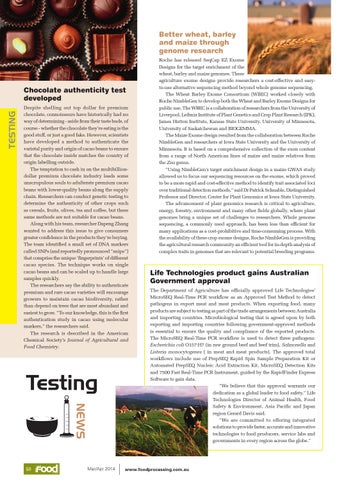Better wheat, barley and maize through genome research
TESTING
Chocolate authenticity test developed Despite shelling out top dollar for premium chocolate, connoisseurs have historically had no way of determining - aside from their taste buds, of course - whether the chocolate they’re eating is the good stuff, or just a good fake. However, scientists have developed a method to authenticate the varietal purity and origin of cacao beans to ensure that the chocolate inside matches the country of origin labelling outside. The temptation to cash in on the multibilliondollar premium chocolate industry leads some unscrupulous souls to adulterate premium cacao beans with lower-quality beans along the supply chain. Researchers can conduct genetic testing to determine the authenticity of other crops such as cereals, fruits, olives, tea and coffee, but these same methods are not suitable for cacao beans. Along with his team, researcher Dapeng Zhang wanted to address this issue to give consumers greater confidence in the products they’re buying. The team identified a small set of DNA markers called SNPs (and reportedly pronounced “snips”) that comprise the unique ‘fingerprints’ of different cacao species. The technique works on single cacao beans and can be scaled up to handle large samples quickly. The researchers say the ability to authenticate premium and rare cacao varieties will encourage growers to maintain cacao biodiversity, rather than depend on trees that are most abundant and easiest to grow. “To our knowledge, this is the first authentication study in cacao using molecular markers,” the researchers said. The research is described in the American Chemical Society’s Journal of Agricultural and Food Chemistry.
Testing NEWS
50
Mar/Apr 2014
Roche has released SeqCap EZ Exome Designs for the target enrichment of the wheat, barley and maize genomes. These agriculture exome designs provide researchers a cost-effective and easyto-use alternative sequencing method beyond whole genome sequencing. The Wheat Barley Exome Consortium (WBEC) worked closely with Roche NimbleGen to develop both the Wheat and Barley Exome Designs for public use. The WBEC is a collaboration of researchers from the University of Liverpool, Leibniz Institute of Plant Genetics and Crop Plant Research (IPK), James Hutton Institute, Kansas State University, University of Minnesota, University of Saskatchewan and BIOGEMMA. The Maize Exome design resulted from the collaboration between Roche NimbleGen and researchers at Iowa State University and the University of Minnesota. It is based on a comprehensive collection of the exon content from a range of North American lines of maize and maize relatives from the Zea genus. “Using NimbleGen’s target enrichment design in a maize GWAS study allowed us to focus our sequencing resources on the exome, which proved to be a more rapid and cost-effective method to identify trait associated loci over traditional detection methods,” said Dr Patrick Schnable, Distinguished Professor and Director, Center for Plant Genomics at Iowa State University. The advancement of plant genomics research is critical to agriculture, energy, forestry, environment and many other fields globally, where plant genomes bring a unique set of challenges to researchers. Whole genome sequencing, a commonly used approach, has been less than efficient for many applications as a cost-prohibitive and time-consuming process. With the availability of these crop exome designs, Roche NimbleGen is providing the agricultural research community an efficient tool for in-depth analysis of complex traits in genomes that are relevant to potential breeding programs.
Life Technologies product gains Australian Government approval The Department of Agriculture has officially approved Life Technologies’ MicroSEQ Real-Time PCR workflow as an Approved Test Method to detect pathogens in export meat and meat products. When exporting food, many products are subject to testing as part of the trade arrangements between Australia and importing countries. Microbiological testing that is agreed upon by both exporting and importing countries following government-approved methods is essential to ensure the quality and compliance of the exported products. The MicroSEQ Real-Time PCR workflow is used to detect three pathogens: Escherichia coli O157:H7 (in raw ground beef and beef trim), Salmonella and Listeria monocytogenes ( in meat and meat products). The approved total workflows include use of PrepSEQ Rapid Spin Sample Preparation Kit or Automated PrepSEQ Nucleic Acid Extraction Kit, MicroSEQ Detection Kits and 7500 Fast Real-Time PCR Instrument, guided by the RapidFinder Express Software to gain data. “We believe that this approval warrants our dedication as a global leader to food safety,” Life Technologies Director of Animal Health, Food Safety & Environment, Asia Pacific and Japan region Gerard Davis said. “We are committed to offering integrated solutions to provide faster, accurate and innovative technologies to food producers, service labs and governments in every region across the globe.”
www.foodprocessing.com.au
